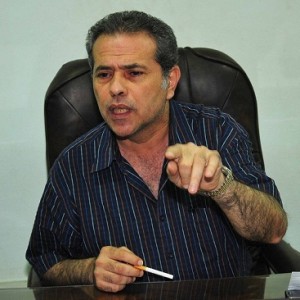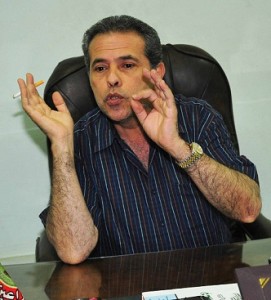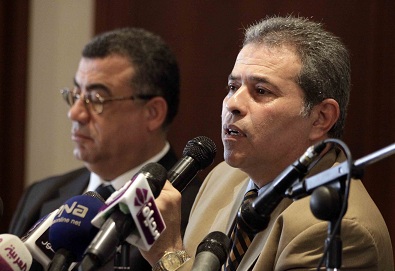
In his office at his family’s privately-owned television channel, Al-Faraeen, controversial media figure Tawfiq Okasha speaks with Daily News Egypt in his thick rural accent. He discusses recent lawsuits raised against him and how senior figure of the Muslim Brotherhood, Khairat El-Shater, has been sending death threats to him and his family.
Surrounded by pictures of himself riding and standing beside Arabian horses, the Masr Al-Youm anchor seems intent to present himself as a candidate for Egypt’s presidency. During the interview, Okasha continually points out numerous awards and certificates hanging on his walls, and boasts he has invented a new school of media in Egypt. He is certain that a revolution against the Muslim Brotherhood is soon to rock the country.
How do you comment on accusations you incited people to kill the Egyptian president?
So far, until yesterday, 28 cases have been filed against us. Only three days ago, before the Eid vacation, they counted only 24 cases. Twenty-eight is almost the total number of Egyptian governorates. There are two cases in Luxor. In Cairo, there are two or three cases. There are cases that have been filed against us in Alexandria, Al-Beheira, and Al-Mansoura. They deliberately focused on Al-Daqahleya, my own governorate, to give the impression that I do not have supporters on my own turf. They forget Al-Daqahleya supported Ahmed Shafiq because of me.
The truth is they are attempting to financially ruin me. Fortunately, the lawyers in the defence committee, led by Khalid Sulayman, work for me for free. Those who have filed cases against me are members of the illegal and illegitimate Muslim Brotherhood. Not a single person outside of the Muslim Brotherhood has filed a case against me.
What about the video clips showing you calling for the “spilling of a person’s blood.” Were you referring to President Morsy?
This clip was deliberately taken out of context. This issue has been subsequently hyped-up by the Muslim Brotherhood. In my interview with Hafiz Al-Mirazi, a respectable media figure, he made the issue clear. I was not directing my speech at Morsy. I was replying to someone who had sent me letters threatening to kill me, my wife, and my children. All I said was, “in the same way you want to kill me, I will spill your blood.”
There was a conversation between me and the new Freedom and Justice Party chairman, Saad Al-Katatni. I sat next to him during the funeral procession for Field Marshall Hussein Tantawi’s brother. I told him you are all upset with me now, but you must know that this is all a political struggle. As long as you accept transparent politics, then you have to endure political battles in the open. He agreed with me, and insisted that it wasn’t personal. I then complained about the threatening letters I had been receiving, and recounted the details of threats directed towards my wife and children. I said to [Katatni] that if he wants me to reply to this, I will, and that if the aim of such letters is to put fear in my heart, I do not fear anything. I told him that if the Muslim Brothers want to spill my blood, I will call for the spilling of the blood of whoever is threatening me. And by the way, I knew who was sending these letters, and he [Katani] also knew.
So then, why didn’t you file a case against this person, and avoid being misunderstood?
I did actually file several reports against him. These reports are currently under investigation by the attorney general. This individual is one of the prominent figures of the Muslim Brotherhood, he’s from my own governorate, Al-Daqahleya.
Can you tell us who this person is?
It is Khairat El-Shater. People do not know that my home village is very close to El-Shater’s. He and his cohorts are behind the threats. The ‘children’ around him.
One of the letters said that Khairat El-Shater was giving the orders. They said they were going to shoot at my car, which actually happened, but luckily I was not inside. They also threatened to shoot my wife on her way to the ministry hall, and said El-Shater prevented them at the last moment, under the pretext that killing women is not permissible.
They made threats, which were actually carried out. Roughly more than a year ago. They mentioned this in a letter and said they had discovered afterwards that I was not in the car, which was true. In fact, they did not want to kill me; they only wanted to shoot at the car to threaten me. They mentioned the incident, and even specified the location where I had parked the car.
What about the court ruling in which you were sentenced in absentia to four months in prison for insulting the president?
There are 27 cases on this issue of insulting the president. They are all just one report, printed 27 times, and signed by 27 different people. It means that if we win in a single case, the entire 26 remaining ones will be gone. As for the latest court decision, releasing me for EGP 1,000 on bail, it is purely political and not judicial. The head of the jury saw that the best option was to prevent his jury from being sacked.
What did you say exactly to insult the president?
I said, “the effendi sitting in the palace.” In our village, when we want to bestow special respect on someone, we call him effendi. When a poet composes verses, don’t they say that the meaning is inside the poet? This is the same, the meaning was inside me. From the point of view of vocabulary, I did not insult him by saying “effendi.”
How do you explain the continuing conflict between Al-Faraeen Channel and the Nile Sat Company, despite a court ruling obliging Nile Sat to reinstate the broadcast of Al-Faraeen within 24 hours?
This crisis has several dimensions. The first dimension is us not being fully absorbed by the Nile Sat legal department, and the other dimension is political. By political, I mean instructions from Salah Abdul-Maqsoud banning the broadcast of the channel.
It is well known that Abdul-Maqsoud, who is the minister of information, used to be a journalist in Al-Shaab newspaper, for a couple of years. When Al-Shaab was banned, he had no income, and he started raising and selling poultry. I am not being funny by the way, I am telling you the facts. Abdul-Maqsoud raised chickens with one of his colleagues from Al-Shaab newspaper. Then, when he eventually became the minister of interior, he was unable to differentiate between ministerial work and raising poultry.
I would say that EGP 207,000 is the amount of Al-Fareen’s debt, and Nile Sat itself is the main reason behind this. The Nile Sat systems were extremely weak, and were vulnerable to being hacked and signal disturbance. Supposedly, the system should be immune to that sort of disturbance. In fact, over the course of the past couple of years, Al-Faraeen was targeted by this signal disturbance four or five times, to the point that the channel had to change its frequency three times. This resulted in several potential advertisers no longer wanting to use the channel. This severely impaired the channel’s source of income.
In light of your new National People’s Party, are there any plans to cooperate with civil parties to counteract Islamism?
I am allying with such powers, but just through myself. I have not coordinated with anyone. I saw people making a stance, so I stood by them.
Why did you call for mass protests under the slogan, “Egypt is for all Egyptians” and not show up yourself?
Actually half of those who were in Tahrir Square are my supporters. This is why they did not suffer any harm. If they were a tiny group, they would have been beaten in the same way Amr Moussa’s supporters were. But I was not there myself.
Are you willing to cooperate with Hamdeen Sabahy or Abdel Moneim Aboul Fotouh against Islamist groups?
I am ready to ally with Hamdeen Sabahy and anyone who has a clear stance against the Brotherhood. I support the Popular Current but have not joined it. However, I do not reject the idea of joining any alliance that stands against this illegitimate and illegal society.
Civil powers refuse to ally with me, under the pretext that I am part of the remnants of the ousted regime or feloul. By the way, feloul means infidels of Quraysh.
How would you respond to those who describe you as a controversial media figure?
What does controversial mean?

You sometimes occupy a great deal of your show presenting your own point of view, while neutral media tends not present personal perspectives.
You see, Egypt is witnessing a crisis. Those who are neutral while Egypt is in crisis, are unsuccessful. There is something called “crisis media.” This means we should be dealing with such a crisis, and directing people to stand against it. This is extremely necessary, taking into account a considerable amount of the population who never previously followed politics.
The “neutral” media let the Muslim Brotherhood monopolise the marginalised population by playing on religious ideas. I believe that media possesses distinct roles, and that neutrality is a general term. One of the media’s roles is to propagate culture, science, and so on.
I have recently played an unusual role in raising political awareness among the people. I did not present my own opinion per say. For instance, it is not my own opinion to state that Sayyid Qutb is the founder of international terrorism. This is quoted in a speech from the CIA and numerous legal organisations in light of his book Milestones. When Hassan Al-Banna received a check worth 5,000 British pounds in 1933, from the Suez Canal Company, under the instructions of Intelligence MI-5, is this my personal viewpoint? This is a fact.
Some of your criticism of individuals has been controversial. For instance, before the revolution, you lauded Mubarak’s achievements, all that changed after 25 January.
I tell you, may Allah bless Mubarak’s days in contrast to what we are witnessing now. I cursed him after the revolution when I was under the impression that true change would take place. Now after I have seen and heard the outcome, I say it publicly, that Mubarak at his worst was better than the current situation. Even if Mubarak was a thief, he would be better than what we are currently experiencing.
In some cases you have addressed Islamist figures, as described in one of the lawsuits, in a derogatory manner.
The court acquitted me of this accusation. This means that right is on my side, not theirs. I was exoneration in the cases of Alaa Al-Aswany and Khalid Said’s mother, why? What I said about Al-Aswany, backed up with documents, was that he drove the people towards abnormal thought. I showed how in his books he permitted homosexuality and lesbianism.
In one of your clips, you accuse a TV presenter of being ignorant.
This is not my point of view, this is the truth. I even called for debates with people whom I accused of being ignorant, and these calls have still not been answered.
What about when you accused ElBaradei of not knowing the price of a pair of ducks?
This was for the benefit of specific people. It means that whoever has not been born or raised in our society, has not felt its folklore and culture, and has not witnessed its economic circumstances, will be unable to represent society. In order to be a leader, you must come from this society, and know its problems, positives, and negatives. Dr ElBaradei has lived most of his life abroad. He does not know that in several parts of Egypt, such as Al-Monoufia, some mothers raise ducks and use the income to pay the education costs of their children.
Before the revolution, freedom of speech was greater. Even President Mubarak used to say that the sun rose in the morning and that nights were dark by virtue of the talk show programmes.
I am free; this is my personal issue and not a general principle. It all depends on those who watch me; do they approve or disapprove of what I am doing. This is the central question. I have achieved the highest ratings in the history of Arab TV. There is a general rule that says, “speak to the people in their culture’s terms.” When I speak to the people using their own culture, they watch me. Are terms like “ignorant” being used in the street or not? Are we media professionals or prophets? Do we receive revelation? Media professionals are the product of their society.
How would you define your programme?
In my programme, I am targeting education and analysis.
You want to raise the political awareness of people. Could you tell us about your educational background? A PhD in media?
No, it was not in the field of media. You see, I am a politician before a media figure. While media is my job, the public work I do is in politics. I graduated from the Higher Institute of Social Service. Afterwards it became a faculty. Then, I did a diploma in environmental media. Next, I transferred some credit and did some additional studies in the United States to transform both diplomas into a master’s degree, prior to receiving my PhD degree at Lakewood Bradenton University. This is the certificate copy, please publish it. Lakewood Bradenton is a private university specialised in this field. There are only two universities worldwide that specialise in this field, one in the United States and the other in Japan.
My specialisation was in management in all aspects of life. Whoever seeks to raise his educational and scientific level, should not be concerned with what people know about him and his degrees. People are only concerned with hearing the truth.
Do you believe in media honesty and ethics?
Yes, of course. This is a different story. There is always the separation between the rules governing honesty and the working tools. The idea of honesty addresses, first, the issue of not using the media to instigate turbulence, second, to avoid sexual material, third, not to use the media as a tool to disintegrate the family structure, and many other points, such as not broadcasting fabricated news. Everything I have presented so far has been documented, and the proof lies in the various exonerations I have received. Furthermore, everything I had said happened. People saw it happen after they heard it from me.
How do you respond to those accusing you of failing to present a balanced and fair media discourse?
I tell you that even the prophet Muhammad (peace and blessings be upon him) was criticised by unbelievers. There is no one above criticism, even prophets, this is physical. They can criticise me, naturally there is a difference in opinion.
What is your opinion of the constitution?
I do not approve of either the draft or the Constituent Assembly. Sixty per cent of this assembly was chosen from a single political faction, which grants this particular faction the majority in any decision.
You have been accused of close ties with Israeli figures. How do you comment on that?
These are lies. Those who are propagating such fallacies should first go and close the Israeli embassy in Cairo. I have visited Israel for work purposes. Al-Faraeen is the only channel worldwide to broadcast from inside the true Al-Aqsa mosque, located underground. This is the true location of Al-Aqsa mosque, since all of what you see was built by the Umayyad dynasty. Al-Aqsa mosque is located between 12 and 14 metres below ground level. It was initially a cavern in Mount Jerusalem.
What do you predict for the future of Egypt’s politics?
Another revolution, with a 100 per cent certainty, and within few months. It will be a devastating revolution, and it will dwarf the 25 January revolution, but this time it will be against political Islamist groups, and it will be supported by the United States, in the same way it supported the first revolution. The Egyptian people will flock to the streets in unprecedented numbers. The United States will totally support this revolution. This revolution will not only be popular, but will extend to all sectors of the state, the judiciary, the police apparatus, the armed forces, the educational establishment, the health sector, and the early signs have already been seen in Tunisia.
American Zionism will not allow an international illegitimate organisation carry the flag of Islam, even if its custodians are hiding behind slogans to achieve their own gains.


